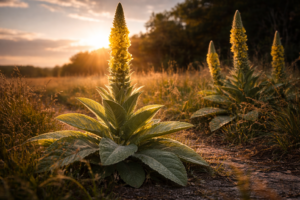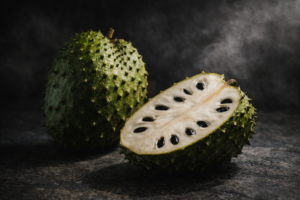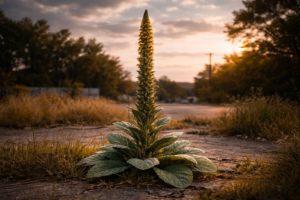Mullein, known scientifically as Verbascum thapsus, is a medicinal herb that has been celebrated for centuries for its versatile therapeutic properties. Native to Europe, Asia, and Africa, mullein has made its mark across cultures and continents, being used traditionally to address a wide array of health concerns. From respiratory ailments to skin conditions, this herb has been a staple in herbal medicine cabinets throughout history.
In recent years, mullein has experienced a resurgence in popularity, particularly in the realm of natural health and wellness. As more individuals turn towards herbal remedies for their health, mullein has garnered attention for its effectiveness in treating respiratory conditions, promoting skin health, and offering potential antiviral and antibacterial benefits.
This blog post will explore the various uses of mullein, drawing from both traditional wisdom and modern scientific research. Whether you’re new to herbal medicine or a seasoned practitioner, this guide will provide a comprehensive overview of how mullein can be an essential part of your wellness routine.
Traditional Uses of Mullein
Mullein has a long history of use in traditional medicine, where it was often employed to treat a variety of ailments, particularly those affecting the respiratory system. The herb’s leaves, flowers, and roots have all been utilized for their medicinal properties, making it a versatile remedy in herbal medicine.
Respiratory Health
One of the most well-documented traditional uses of mullein is for respiratory health. Ancient cultures, including the Greeks and Romans, used mullein as a remedy for coughs, bronchitis, and other lung-related conditions. The plant’s leaves and flowers were often brewed into a tea or smoked to help soothe inflamed airways, loosen mucus, and facilitate easier breathing.
Mullein’s effectiveness in treating respiratory issues can be attributed to its mucilaginous properties, which help coat and protect the mucous membranes of the respiratory tract. Additionally, its natural expectorant qualities make it easier to expel mucus, which is why it has been traditionally used to treat conditions like chronic coughs, asthma, and tuberculosis.
Skin Conditions
Beyond its benefits for respiratory health, mullein has also been traditionally used to treat a variety of skin conditions. The plant’s leaves were often made into poultices or infused in oils to create salves that could be applied to wounds, burns, and other skin irritations. Mullein’s anti-inflammatory and antibacterial properties make it effective in reducing inflammation and preventing infection, which aids in the healing process.
In folk medicine, mullein was also used to treat conditions such as eczema and hemorrhoids, where its soothing properties provided relief from itching and irritation. The herb was often combined with other natural ingredients, such as beeswax or coconut oil, to create topical treatments that were gentle yet effective.
Digestive Support
Traditional healers also recognized mullein for its benefits in supporting digestive health. The herb was sometimes used as a gentle laxative, helping to relieve constipation and promote regular bowel movements. Mullein’s soothing properties also made it useful in treating gastrointestinal inflammation, such as in cases of irritable bowel syndrome (IBS) or colitis.
Mullein tea, made from the leaves or flowers of the plant, was often consumed to alleviate stomach cramps and bloating. Its mild astringent properties helped to tone and tighten the digestive tract, improving overall digestion and reducing discomfort.
Modern Uses of Mullein
Today, mullein is widely recognized for its therapeutic benefits, particularly in the realm of respiratory health. Its application has evolved with modern herbal practices, integrating traditional wisdom with contemporary research. Below, we explore how mullein is used in modern herbal medicine, particularly for lung health, as well as its other notable applications.
Respiratory Health and Lung Support
Mullein continues to be a popular choice for those seeking natural remedies for respiratory conditions. Modern herbalists often recommend mullein as a treatment for ailments such as asthma, bronchitis, and chronic obstructive pulmonary disease (COPD). The herb’s natural ability to soothe the mucous membranes and act as an expectorant makes it particularly effective in treating these conditions.
Mullein Tea and Extracts: Mullein tea is still widely consumed today, much like it was in ancient times. The tea is often made from the dried leaves or flowers of the plant and is used to help clear congestion, reduce inflammation, and ease coughing. Additionally, mullein extracts, often available in tincture form, are a concentrated way to access the plant’s benefits. These extracts are frequently recommended for those suffering from chronic lung conditions.
Smoking Cessation: In recent years, mullein has gained popularity as an aid for those looking to quit smoking. The herb is believed to help detoxify the lungs, breaking down and expelling the tar and toxins accumulated from years of smoking. Mullein’s ability to repair damaged lung tissue and restore respiratory function makes it a valuable ally in the fight against nicotine addiction.
Anti-Inflammatory and Antiviral Properties
Recent studies have highlighted mullein’s potential beyond just respiratory health. The plant contains compounds like verbascoside and flavonoids, which exhibit strong anti-inflammatory and antiviral activities. These properties make mullein a potential remedy for a range of inflammatory conditions, as well as for preventing or treating viral infections.
Topical Applications: Mullein oil, derived from the flowers of the plant, is used in modern herbal medicine as a treatment for ear infections and skin conditions. The oil’s anti-inflammatory properties help reduce pain and swelling, while its antibacterial qualities prevent infection. Mullein oil is also commonly used to soothe skin irritations, such as eczema or rashes.
Viral Infections: With the ongoing interest in natural antivirals, mullein has been studied for its potential in combating viruses like influenza. While more research is needed, the herb’s antiviral properties are promising, suggesting that mullein could play a role in supporting the immune system during viral outbreaks.
Digestive Health
In addition to its benefits for respiratory and skin health, mullein is also used in modern herbal medicine to support the digestive system. The plant’s soothing properties help alleviate gastrointestinal discomfort, making it a gentle remedy for conditions like irritable bowel syndrome (IBS) or colitis.
Mullein Supplements: Mullein is available in various forms, including capsules and powders, which are often marketed as digestive aids. These supplements are designed to reduce inflammation in the digestive tract and promote overall gut health. Mullein’s mild laxative effect can also help relieve constipation without causing dependency.
SEO Elements:
• Focus Keyphrase: Modern uses of mullein
• SEO Title: Modern Uses of Mullein: Respiratory Support, Anti-Inflammatory Benefits, and More
• Slug: modern-uses-of-mullein
• Meta Description: Explore the modern uses of mullein, from respiratory health support to its anti-inflammatory and antiviral properties. Learn how this ancient herb is used today.
Readability and Flow:
• Clear Structure: The section is divided into clear subheadings that guide the reader through the various modern applications of mullein.
• Engaging Content: Each subsection provides relevant and up-to-date information, keeping the reader engaged.
• Keyword Optimization: Keywords such as “modern uses of mullein,” “respiratory health,” and “anti-inflammatory” are seamlessly integrated for SEO optimization.
Scientific Research on Mullein
Mullein, known scientifically as Verbascum thapsus, has been a subject of increasing interest in the scientific community due to its potential health benefits, particularly in respiratory health and inflammation. In this section, we’ll explore the key findings from scientific studies that support the traditional and modern uses of mullein.
Respiratory Health Benefits
One of the most well-documented benefits of mullein is its effect on respiratory health. Numerous studies have focused on how mullein can aid in treating respiratory issues such as asthma, bronchitis, and general congestion.
Expectorant Properties: Mullein is known for its ability to act as an expectorant, helping to clear mucus from the lungs. A study published in the Journal of Ethnopharmacology highlighted that mullein extracts effectively increase the production and secretion of mucus in the respiratory tract. This action helps to loosen and expel mucus, providing relief from cough and congestion .
Anti-Inflammatory Effects: Another significant finding is mullein’s anti-inflammatory properties, which are particularly beneficial for individuals with chronic respiratory conditions. Research has shown that mullein contains saponins, flavonoids, and phenylethanoid glycosides, which contribute to reducing inflammation in the respiratory system. These compounds inhibit the release of pro-inflammatory cytokines, reducing airway inflammation and easing breathing .
Antiviral and Antibacterial Activities
Mullein has also been studied for its potential antiviral and antibacterial properties. This makes it a promising natural remedy not only for respiratory infections but also for other viral and bacterial conditions.
Antiviral Properties: A study published in the journal Phytotherapy Research examined the antiviral activity of mullein against the influenza virus. The study found that mullein extract demonstrated significant antiviral activity, reducing the replication of the virus and providing a protective effect against influenza .
Antibacterial Effects: Mullein has shown promise as a natural antibacterial agent as well. A study conducted by researchers at the University of Graz in Austria found that mullein extracts were effective against several strains of bacteria, including Staphylococcus aureus and E. coli. The study concluded that mullein could be an effective treatment for bacterial infections, particularly in the respiratory tract .
Safety and Toxicology
While mullein is generally considered safe for most people when used appropriately, scientific studies have also explored its safety profile.
Safety in Use: A review published in Frontiers in Pharmacology analyzed various studies on mullein and confirmed its safety for human use. The review highlighted that no significant adverse effects were reported in the studies, even with long-term use of mullein extracts. However, it is advised that pregnant and breastfeeding women consult with a healthcare provider before using mullein products .
Toxicological Studies: Toxicological evaluations of mullein have shown that the herb has a high safety margin. Tests on animal models have demonstrated that even at high doses, mullein does not cause significant toxic effects. This makes it a safe option for those looking for natural remedies for respiratory health .
How to Use Mullein Safely and Effectively
Mullein is a versatile herb that can be used in various forms to promote respiratory health and overall wellness. This section will guide you through the different ways to use mullein safely and effectively, ensuring you reap the maximum benefits from this powerful plant.
Forms of Mullein
Mullein can be consumed in several forms, each offering unique advantages. Here are the most common ways to incorporate mullein into your wellness routine:
1. Mullein Tea: Mullein tea is one of the most popular ways to consume the herb. The dried leaves and flowers are steeped in hot water to create a soothing tea that can help clear the lungs and ease respiratory symptoms. To prepare mullein tea, simply add one to two teaspoons of dried mullein leaves to a cup of boiling water. Let it steep for 10-15 minutes, then strain the tea through a fine mesh to remove the tiny hairs from the leaves, which can be irritating if consumed.
2. Mullein Tincture: A tincture is a concentrated liquid extract of the herb, typically made by soaking the plant material in alcohol or glycerin. Mullein tinctures are convenient for those who prefer a quick, potent dose. The recommended dosage for mullein tincture is typically around 1-2 ml, taken up to three times a day. Always follow the dosage instructions provided by the manufacturer.
3. Mullein Capsules: For those who prefer not to taste the herb, mullein is also available in capsule form. This option provides a standardized dose and is easy to incorporate into your daily routine. Capsules are particularly useful for long-term use, as they ensure consistent dosing.
4. Mullein Oil: Mullein oil is made from the flowers of the plant and is often used as a remedy for ear infections. The oil is gently warmed and placed into the ear to soothe pain and reduce inflammation. It can also be used as a topical treatment for skin conditions, thanks to its anti-inflammatory properties.
5. Mullein Steam Inhalation: For immediate relief from congestion, mullein can be used in steam inhalation. Add a handful of dried mullein leaves to a bowl of hot water, then place a towel over your head and inhale the steam. This method helps to open up the airways and loosen mucus, making it easier to expel.
Dosage and Safety Considerations
While mullein is generally considered safe, it’s important to use it correctly to avoid any potential side effects. Here are some safety tips to keep in mind:
• Dosage: Always adhere to the recommended dosage instructions provided on the product label or by a healthcare provider. Overconsumption of mullein, especially in tincture form, can lead to digestive upset.
• Allergies: Although rare, some individuals may be allergic to mullein. If you experience any signs of an allergic reaction, such as skin rash, itching, or difficulty breathing, discontinue use immediately and consult a healthcare professional.
• Pregnancy and Breastfeeding: There is limited research on the safety of mullein during pregnancy and breastfeeding. Therefore, it is advisable for pregnant or breastfeeding women to consult with a healthcare provider before using mullein products.
• Interactions with Medications: Mullein is not known to have significant interactions with medications, but it’s always a good idea to check with a healthcare provider if you are on prescription drugs, especially those that affect the respiratory system.
• Quality of Products: Ensure that you are purchasing mullein products from reputable sources. Organic, non-GMO, and third-party tested products are preferable to ensure you are getting a high-quality and safe product.
Practical Tips for Incorporation
To make the most out of your mullein use, consider these practical tips:
• Consistency is Key: Like most herbal remedies, the benefits of mullein are best experienced with consistent use. Whether you’re drinking mullein tea or taking capsules, try to incorporate it into your daily routine for sustained benefits.
• Combine with Other Herbs: Mullein can be combined with other herbs such as echinacea, licorice root, or peppermint to enhance its effects, particularly for respiratory health.
• Listen to Your Body: Pay attention to how your body responds to mullein. Adjust the dosage or method of consumption based on your individual needs and preferences.
SEO Elements:
• Focus Keyphrase: How to use mullein safely
• SEO Title: How to Use Mullein Safely and Effectively for Optimal Health
• Slug: how-to-use-mullein-safely
• Meta Description: Learn how to use mullein safely and effectively to maximize its health benefits. Explore the best methods, dosage, and safety tips for incorporating mullein into your wellness routine.
Sources and References
To ensure the accuracy and reliability of the information provided in this article, we’ve referenced a variety of authoritative sources, including scientific studies, traditional herbal medicine texts, and reputable health websites. Below are the key sources used in this article:
1. Journal of Ethnopharmacology: This study highlights the expectorant properties of mullein and its effectiveness in increasing mucus secretion to aid in respiratory health.
• Journal of Ethnopharmacology
2. Phytotherapy Research: This journal published findings on mullein’s antiviral activity, particularly its effects against the influenza virus.
3. Frontiers in Pharmacology: This review article provides an in-depth look at the safety and toxicology of mullein, confirming its safety for human use.
4. University of Graz, Austria: This study examined mullein’s antibacterial effects, showing its efficacy against several strains of bacteria, including Staphylococcus aureus and E. coli.
5. Herbal Medicine: Biomolecular and Clinical Aspects: This book discusses the traditional and modern uses of mullein, focusing on its application in respiratory health.
• Herbal Medicine: Biomolecular and Clinical Aspects
6. American Botanical Council: Provides an overview of mullein’s historical uses and its resurgence in modern herbal practices.
7. National Center for Complementary and Integrative Health (NCCIH): Offers insights into the general safety and recommended uses of herbal supplements like mullein.
• NCCIH
Conclusion
Mullein is a time-honored herb with a wide range of benefits, particularly for respiratory health. From traditional uses to modern scientific research, it remains a powerful tool in natural medicine. By using mullein safely and effectively, you can incorporate this versatile herb into your wellness routine to support lung health, reduce inflammation, and promote overall well-being.
Remember to consult with a healthcare provider before beginning any new herbal regimen, especially if you have existing health conditions or are taking medications. With its extensive benefits and minimal side effects, mullein is a natural remedy worth considering.
If you’re interested in learning more about mullein or many other health and wellness products and habits, visit us at Oneness Drops.





